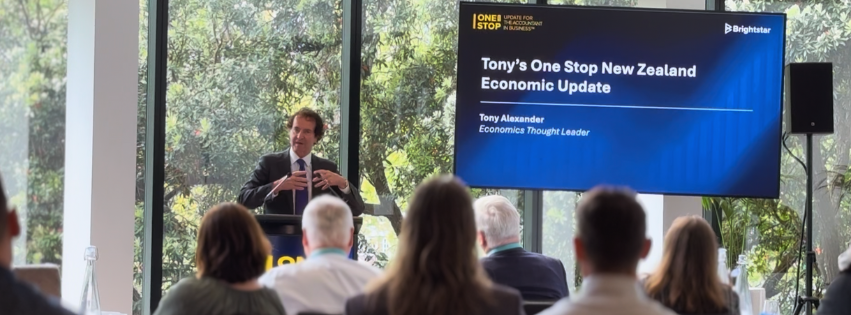
An audience member at a recent One Stop Update for the Accountant in Business Conference posed a thought-provoking question to renowned New Zealand economist Tony Alexander: If he could implement just one tax change, what would it be?
His answer, probably not what you would expect. Alexander suggested increasing the Goods and Services Tax (GST) to 25% while simultaneously lowering the marginal tax rate.
While such a radical change is unlikely to be implemented in the near future, what could a change like this mean if it were to be? Here are some potential pros and cons of this hypothetical scenario.
Potential pros:
- Increased Government Revenue: A significant GST hike would generate substantial additional revenue for the government. This could be used to fund essential services, reduce the national debt, or provide tax cuts for other income brackets.
- Stimulation of Savings: Lower marginal tax rates would incentivize individuals to save more of their income. This could lead to increased investment and economic growth in the long run.
- Reduced Tax Burden on Businesses: A decrease in the marginal tax rate could lighten the tax burden on businesses, making New Zealand more attractive for investment and job creation.
- Potential for Lower Prices: The theory of supply-side economics suggests that lower marginal tax rates could lead to lower prices. By incentivizing businesses to expand their operations and increase production, the overall supply of goods and services in the market could increase, driving down prices.
Highlights from the 55th One Stop Update for the Accountant in Business – Auckland 2024
Potential cons:
- Increased Cost of Living: A 25% GST would significantly increase the cost of living for New Zealanders, particularly for low-income households. This could lead to increased inequality and social unrest.
- Reduced Consumer Spending: Higher prices due to the GST hike could reduce consumer spending, negatively impacting businesses and the overall economy.
- Potential for Inflation: A significant increase in government spending financed by the GST hike could lead to inflation, eroding the purchasing power of consumers.
- Uncertainty Regarding the Impact on Prices: While the theory of supply-side economics suggests that lower marginal tax rates could lead to lower prices, there is no guarantee that this would be the case in practice. Other factors, such as demand, input costs, and government regulations, can also influence prices.
It’s important to note that this is a purely hypothetical scenario, and the actual consequences of such a tax change would depend on a variety of factors, including the government’s approach to spending the additional revenue and the overall state of the economy.
Tony Alexander’s unconventional proposal serves as a powerful reminder of the value of challenging conventional thinking and exploring innovative solutions. Such thought-provoking ideas, even if seemingly impractical, can be catalysts for creative problem-solving and strategic adaptation. Forums like the One Stop Update for the Accountant in Business provide invaluable platforms for industry professionals to exchange ideas, foster collaboration, and collectively identify novel approaches to address emerging challenges. By encouraging open dialogue and intellectual curiosity, these events can stimulate the development of innovative strategies that drive business growth and resilience in an ever-changing landscape.
What would your one change be?
Upcoming events in Finance & Accounting:




